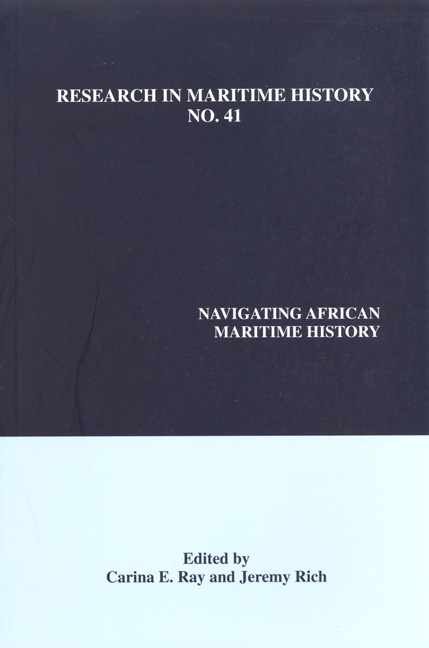Book contents
- Frontmatter
- Table of Contents
- About the Editors
- Contributors' Notes
- “Introduction: Charted Routes and New Directions in the Study of Africa's Maritime History”
- “Austronesian Mariners and Early Trans-Indian Ocean Crossings”
- “Eight Hens per Man per Day: Shipwreck Survivors and Pastoral Abundance in Southern Africa”
- “State Control and Regulation of Commerce on the Waterways and Coast of Senegambia, ca. 1500-1800”
- “Swimming, Surfing and Underwater Diving in Early Modern Atlantic Africa and the African Diaspora”
- “Rough Sailing: Risks and Opportunities for Immigrant African Maritime Workers in Gabon, ca. 1860-1914”
- “Desertion, Dereliction and Destitution: The Travails of Stranded West African Seamen in the United Kingdom, ca. 1921-1934”
- “‘The White Wife Problem:’ Sex, Race and the Contested Politics of Repatriation to Interwar British West Africa”
- “Sailing Beyond Apartheid: The Social and Political Impact of Seafaring on Coloured South African Sailors”
“Desertion, Dereliction and Destitution: The Travails of Stranded West African Seamen in the United Kingdom, ca. 1921-1934”
- Frontmatter
- Table of Contents
- About the Editors
- Contributors' Notes
- “Introduction: Charted Routes and New Directions in the Study of Africa's Maritime History”
- “Austronesian Mariners and Early Trans-Indian Ocean Crossings”
- “Eight Hens per Man per Day: Shipwreck Survivors and Pastoral Abundance in Southern Africa”
- “State Control and Regulation of Commerce on the Waterways and Coast of Senegambia, ca. 1500-1800”
- “Swimming, Surfing and Underwater Diving in Early Modern Atlantic Africa and the African Diaspora”
- “Rough Sailing: Risks and Opportunities for Immigrant African Maritime Workers in Gabon, ca. 1860-1914”
- “Desertion, Dereliction and Destitution: The Travails of Stranded West African Seamen in the United Kingdom, ca. 1921-1934”
- “‘The White Wife Problem:’ Sex, Race and the Contested Politics of Repatriation to Interwar British West Africa”
- “Sailing Beyond Apartheid: The Social and Political Impact of Seafaring on Coloured South African Sailors”
Summary
Introduction
The literature on seafaring in West Africa has focused essentially on the Kru, an indigenous, seafaring people of Liberia and Sierra Leone. Much has been written about their labour recruitment practices, overall contribution to the conduct of maritime trade between West Africa and the wider world, and the social impact of their migrations, settlement and cultural interactions along the West African coastline. A neglected theme is the welfare of stranded and destitute West African seamen in the United Kingdom which generated a humanitarian crisis and controversy between the early 1920s and the mid-1930s. The seamen's crisis in the immediate post-World War I years was part of the global dislocation that followed the postwar boom of 1918-1920. The magnitude of this crisis might be judged against the claim that a “considerable number, some hundreds, of Africans, had been stranded after the war in…Liverpool, Cardiff, Hull, Manchester and London.” Though the distribution of stranded seamen cannot be established with precision, the large number of persons involved, which ran into the unspecified “hundreds,” is indicative of a major social problem in the aftermath of World War I. It is important to note, however, that its scale cannot be fully appreciated if considered narrowly from the perspective of the few (but fairly representative) examples cited later in this chapter. Nonetheless, these case studies provide valuable insights into the complex nature of the situation that stranded seamen encountered in the interwar years.
This essay reconstructs and contextualizes this episode against the broader canvas of global economic dynamics, pressure-group politics, contemporary race relations and imperial-colonial policy during the interwar years. On the one hand, it analyzes the provisions, interpretation and enforcement of legislation governing desertion by, and the abandonment and destitution of, seamen. On the other, with specific reference to seamen of West African provenance it sheds light on the legal and social (including racial) dimensions of the problem of seamen's welfare and the roles played by the imperial and colonial governments, religious and humanitarian bodies and citizens’ pressure groups in Britain and West Africa to resolve the problem during this period.
A significant contribution of this essay is the demonstration of the diversity of the maritime labour force in colonial West Africa.
- Type
- Chapter
- Information
- Navigating African Maritime History , pp. 139 - 162Publisher: Liverpool University PressPrint publication year: 2009



